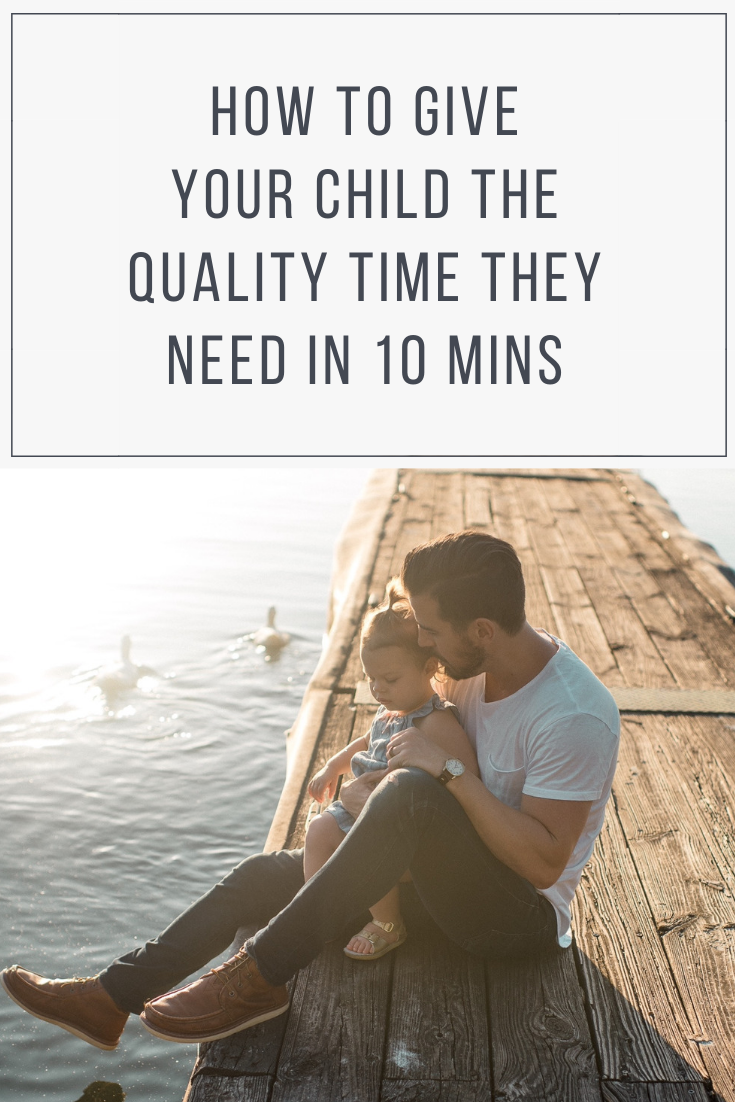How To Give Your Child The Quality Time They Need In 10 mins
Many of the daily behavioral challenges we see with our children (such as whining, grumpy attitudes, & tantrums), can be a sign that they are needing more love and attention.
It is often a sign that their ‘emotional cup’ is empty.
We all have an ‘emotional cup’.
When our emotional cup is filled up, we are the best version or ourselves. We are happier, feel connected with others, & have more patience with the frustrations of daily life.
When our emotional cup is low or empty, we become the worst versions of ourselves. We are grumpy, angry, & often over-react to the frustrations of daily life.
Our emotional cup is filled up when those we love, spend time with us & give us a safe place to know we’re loved.
This is true for adults as well as children.
THINGS THAT EMOTIONALLY DRAIN A CHILD
Although the normal demands of life can be emotionally draining to children, this is particularly noticeable when they are going through challenging situations.
This may include:
- Moving house
- A new family member
- Starting preschool or school
- Divorce or re-marriage of parents
- Relationship conflicts with their friends
- Parents away working significantly longer hours
- Too much pressure of school or activities, & not enough ‘down time’
When you child begins to consistently behave out of character, it can be a sign they are looking for extra love and attention.
SIGNS YOUR CHILD IS LOOKING FOR EXTRA LOVE & ATTENTION
- They emotionally over-react to situations
- They are constantly whining & complaining
- They’re really angry about things they aren’t normally angry about
- They keep asking you to play with them
- They start using language & words you’ve never heard before
- If you try to discipline their behavior it makes the situation significantly worse
- They are teary but say that they don’t want to talk
- They isolate themselves in their room
- They just don’t seem like themselves
- If you do something loving towards them, they begin to emotionally soften
Before you worry about whether your child might have serious behavioral problems that you need to do something further about, first try intentionally filling their emotional cup & see if you notice a difference.
NOTE ABOUT PARENTAL GUILT
Many times when you become aware that your child may be looking for extra love and attention, you can feel horrible that you didn’t notice it sooner.
The truth is none of us are perfect & no one is getting this right all the time.
All parents and children go through times when their emotional cup is low or empty. You’re never going to be on top of this enough that your child never feels emotionally drained.
Don’t spend your energy beating yourself up, instead focus on what you need to do to remedy the situation.
QUALITY TIME
When you notice that your child’s emotional cup is low, & they are craving love and attention, the best remedy is one on one, quality time together.
Giving your child your focused and undivided attention shows them that they are the most important person in your world, & that you are there for them no matter what they are going through.
REWARDS OF SPENDING QUALITY TIME WITH YOUR CHILD
- Stronger relationship with your child & fulfillment in your parenting
- Less behavioral issues from your child
- Deeper empathy towards them, as you find out what’s really going on in their world
- They will become more cooperative and patient
- They will grow in confidence & be more of who they really are
QUALITY TIME & CHILD DEVELOPMENT
The strategy of spending quality time with your child works best when implemented when your child is 2-3 years old or older.
Developmentally, the age between 0 – 2/3 years old, your child is needing secure attachment from their primary caregiver. This means they want to be around you 24 hours a day. At this age it doesn’t matter how much quality time you give them, they will always want more!
Many of the behavior changes when your child is looking for extra love and attention (listed above), is just the daily life & behavior of a 0-2/3yr old.
It is one of the most demanding stages of parenting so give yourself grace that you’re doing the very best you can.
THE GOOD NEWS
Many times when we talk about spending quality time with our child, we can become overwhelmed.
If we have work demands or multiple children, it can feel like an impossible task.
The truth is that occasional long hours of connection time together isn’t necessarily what your child needs.
The good news is that you can give your child the love and attention they need, simply from spending 10 minutes with them.
Spending regular, ‘ordinary’ time with your child is enough to fill up their emotional cup & give them the love and attention they are craving.
HOW TO MAKE THE 10 MINUTES OF QUALITY TIME WORK
Where you can, choose a regular and predictable time that your child can look forward to with certainty.
This might be before breakfast, or when they come home from school, or just before bedtime – whenever you decide works best for your family.
When you choose a regular and predictable time, it gives your child something stable to look forward to.
Physically set up the environment so that you are an a position to give your focused & undivided attention to your child.
Are your other children looked after, or happily playing independently, or already in bed?
Is your phone in another room or turned onto airplane mode?
Remove the distractions and limit the interruptions where possible.
If you are spending 10 minutes with your child, make that clear at the beginning of your time together.
For younger children (who don’t yet understand the concept of time) you can set a timer that marks the end of the time.
When you create clarity about the time together, it frames expectations for your child, & gives you a sense of predictability of your time.
You can make suggestions about what activity to do, but allow your child to take the lead – this is their time with you.
Choose regular activities such as coloring, taking a walk, playing a board game, throwing a ball, reading a book, or just chatting about the day.
It doesn’t need to be exciting – the purpose is to fuel connection.
When you say things out loud that you are noticing about your time together, you are clearly communicating to your child that you are present & focused on them.
This can be as simple as “I love the red you chose to color the picture” or “I noticed you’ve set your legos up in a very straight line.”
As much as possible, keep the interaction positive at the end of your time together.
Especially for younger child who might want the time to go on longer, they may be resistant to the time ending. This resistance can end in frustration for both the parent and child.
You could end with – “I’ve loved spending this time with you. Now i have to go and make dinner, do you want to come out & help me?”
or “I’ve loved spending this time with you. Now it’s time for bed. I’m looking forward to do it again next time.”
A NOTE ON MULTIPLE CHILDREN
When you have more than 2 children, the idea of even spending 10 minutes every day with each one is overwhelming & virtually impossible to do.
These small consistent times together don’t have to be everyday, they just have to be consistent & predictable.
Start with a routine that you know you can commit to.
Think about when you are looking forward to a date night with your spouse, or a night out with your friends; it may still be a week away but if the plan is already in place, you feel secure that you will get that time.
Children are the same way – they are just looking for certainty.
A NOTE ON BEHAVIORAL ISSUES
If you child is older than 3 years old & you spend regular quality time with them, but they are still overly emotional or angry & displaying many of the behaviors listed above, there is often something else going on.
Sometimes it can be that they have a highly sensitive personality temperament (we have a free guide to help you understand and parent a highly sensitive child CLICK HERE).
Or it may be a sign that they may have additional needs that you haven’t yet noticed & you need to look for professional help.
Many times what we think are challenging behaviors from our child, are just them looking for extra love & attention from us. By implementing regular small increments of focused time together, you can build a fabric of love & security for your child.












